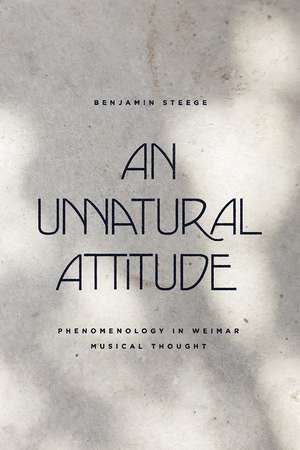An Unnatural Attitude: Phenomenology in Weimar Musical Thought: New Material Histories of Music
Autor Benjamin Steegeen Limba Engleză Hardback – 8 apr 2021
Benjamin Steege interprets this discourse as the response of a young, post–World War I generation amid a virtually uninterrupted experience of war, actual or imminent—a cohort for whom disenchantment with scientific achievement was to be answered by reasserting the value of imaginative thought. Steege draws on a wide range of published and unpublished texts from music theory, pedagogy, criticism, and philosophy of music, some of which appear for the first time in English translation in the book’s appendixes. An Unnatural Attitude considers the question: What are we thinking about when we think about music in non-naturalistic terms?
Preț: 292.24 lei
Preț vechi: 372.06 lei
-21% Nou
Puncte Express: 438
Preț estimativ în valută:
55.95€ • 57.54$ • 46.41£
55.95€ • 57.54$ • 46.41£
Carte indisponibilă temporar
Doresc să fiu notificat când acest titlu va fi disponibil:
Se trimite...
Preluare comenzi: 021 569.72.76
Specificații
ISBN-13: 9780226762982
ISBN-10: 022676298X
Pagini: 312
Ilustrații: 20 line drawings
Dimensiuni: 152 x 229 x 25 mm
Greutate: 0.48 kg
Ediția:First Edition
Editura: University of Chicago Press
Colecția University of Chicago Press
Seria New Material Histories of Music
ISBN-10: 022676298X
Pagini: 312
Ilustrații: 20 line drawings
Dimensiuni: 152 x 229 x 25 mm
Greutate: 0.48 kg
Ediția:First Edition
Editura: University of Chicago Press
Colecția University of Chicago Press
Seria New Material Histories of Music
Notă biografică
Benjamin Steege is associate professor in the Department of Music at Columbia University. He is the author of Helmholtz and the Modern Listener.
Cuprins
List of Examples
Introduction Worldhood and World War
Max Scheler, “Genius of War”
Musicology in the World
From Psychology to Phenomenology
Music in Phenomenological Study
Chapter 1 The Unnatural Attitude
The Acoustical Attitude and the Harmonic Attitude
Beyond Psychologism
“What Is the Phenomenology of Music?”
Chapter 2 Debussy, Outward and Open
An Outward Turn
Dehumanization
Being-There-With Music
Letting Oneself Go
Actuality
Chapter 3 Hearing-With
Case One Aesthetic Hearing (Seventeenth-Century Suite)
Case Two Participatory Hearing (Thirteenth-Century Motet)
Chapter 4 Techniques of Feeling
Appendix A Hans Mersmann, “On the Phenomenology of Music” (1925)
Appendix B Helmuth Plessner, “Response [to Mersmann]” (1925)
Appendix C Paul Bekker, “What Is the Phenomenology of Music?” (1925)
Appendix D Herbert Eimert, “On the Phenomenology of Music” (1926)
Appendix E Günther Stern-Anders, “On the Phenomenology of Listening (Elucidated through the Hearing of Impressionist Music)” (1927)
Acknowledgments
Notes
Bibliography
Index
Introduction Worldhood and World War
Max Scheler, “Genius of War”
Musicology in the World
From Psychology to Phenomenology
Music in Phenomenological Study
Chapter 1 The Unnatural Attitude
The Acoustical Attitude and the Harmonic Attitude
Beyond Psychologism
“What Is the Phenomenology of Music?”
Chapter 2 Debussy, Outward and Open
An Outward Turn
Dehumanization
Being-There-With Music
Letting Oneself Go
Actuality
Chapter 3 Hearing-With
Case One Aesthetic Hearing (Seventeenth-Century Suite)
Joining In
Vocal Hearing and Instrumental Hearing
Vocal Hearing and Instrumental Hearing
Case Two Participatory Hearing (Thirteenth-Century Motet)
Factical Life
Spacing
The Limits of Community
Spacing
The Limits of Community
Chapter 4 Techniques of Feeling
This Is Not a Test
Techniques of Feeling
A Call
Techniques of Feeling
A Call
Appendix A Hans Mersmann, “On the Phenomenology of Music” (1925)
Appendix B Helmuth Plessner, “Response [to Mersmann]” (1925)
Appendix C Paul Bekker, “What Is the Phenomenology of Music?” (1925)
Appendix D Herbert Eimert, “On the Phenomenology of Music” (1926)
Appendix E Günther Stern-Anders, “On the Phenomenology of Listening (Elucidated through the Hearing of Impressionist Music)” (1927)
Acknowledgments
Notes
Bibliography
Index
Recenzii
“In these pages Benjamin Steege recovers, at the very margins of the musical sciences, and against all the odds, a Heideggerian moment, the reverberations of which he traces from the 1920s until they all but fade from hearing three decades later. In the depth and breadth of its synthesis, An Unnatural Attitude provides a model for what it means to write imaginatively about music and conceptual thought.”
“Between the hard-edged Platonism of musical form and the reduction of musical experience to mere psychological effect, an intricate and reflective style of musical thought emerged in Weimar Germany that was influenced by Edmund Husserl’s novel method of phenomenology. Steege’s deep dive into these forgotten figures—supported by forays into political history, textured close readings, and complete translations of primary texts—is a philosophical feast. It illuminates a complicated strain of European music theory embroiled in evolving debates about musical ontology, cultural difference, and social change.”
"Enriched by convincing music-analytical examples, careful handling of philosophical terms of art, and an ethical sensitivity not unlike that of its historical interlocutors, Steege's book—and the writers whose work it examines—is sure to draw attention from music historians and historians of philosophy alike, who will question the relative unfamiliarity of its subject matter and set out to reach out across this gap to explore the models of historical listening it offers."
"Steege's work is an important contribution to music aesthetics."
"An Unnatural Attitude is a serious intellectual history that brings to light the musical thought of actors unfamiliar to the vast majority of music scholars. Ambitiously, Steege writes of both local and global concerns. At times, he suggests that the intentional manner with which one engages with music can shape the history of feeling; at others, he explicates music’s role in forging various types of community and in responding to human-led catastrophes. Densely written and always precise, An Unnatural Attitude is likely to establish itself as a central treatment of its topic: musicologists clearly need to think more deeply about the ideological, philosophical and political implications of that strange practice we call listening."
"Even if one might feel the tension differently oneself, there is no question that this text maintains and communicates it with tremendous skill and historical sensitivity, in both its main chapter sequence and the translated essays that make up a rich set of appendixes."











